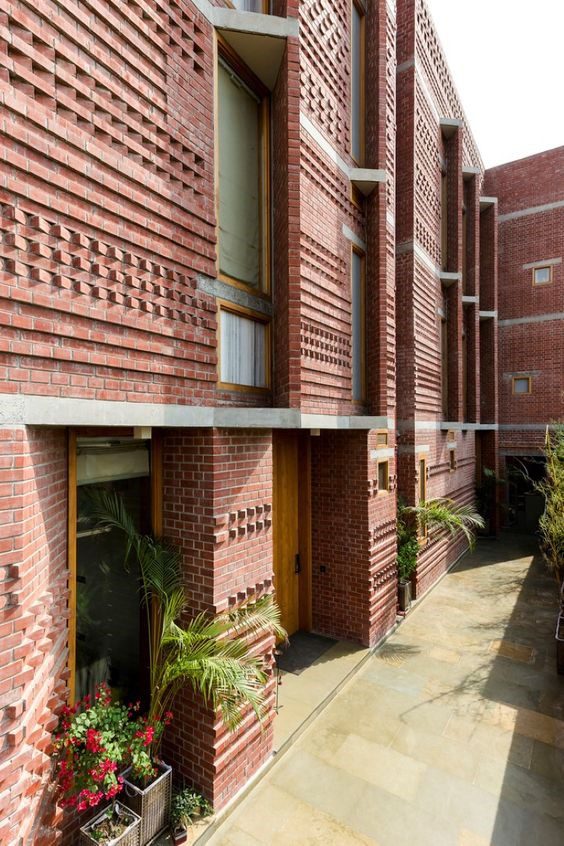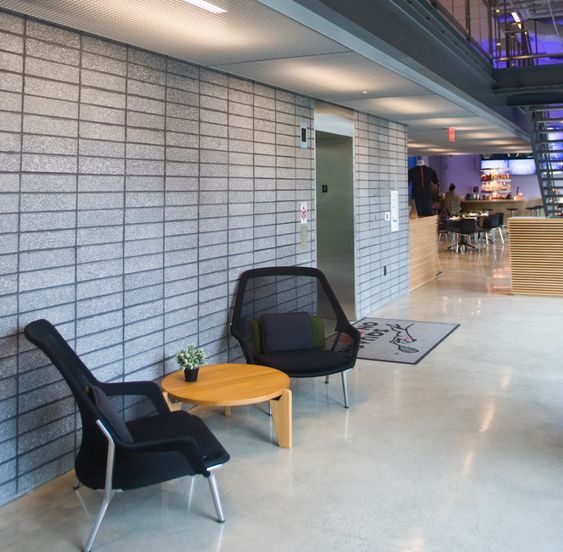Masonry work refers to the use of building materials such as bricks, stones, concrete blocks, and mortar to construct structures and buildings. It is one of the oldest forms of construction and has been used for centuries to build everything from homes to grand structures such as castles and churches. Masonry requires a high level of skill and expertise, as each piece must be precisely placed to ensure the stability and durability of the structure. The mortar used to hold the masonry in place must be carefully mixed to the right consistency and applied correctly.
Masonry work offers many benefits, including durability, fire resistance, and energy efficiency. With the proper care and maintenance, masonry structures can last hundreds of years and are often considered a timeless and beautiful addition to any landscape. For practical or aesthetic reasons, masonry work is popular for many construction projects.
See also: Stone Masonry: Types, advantages, and disadvantages
Masonry work: Types
There are many different types of masonry work. These include:
Brick masonry work

Source: Pinterest
This type of masonry work uses rectangular-shaped bricks made from clay, sand, and water. The bricks are laid in a pattern and joined together using sand, cement, and water mortar. The construction of residential and commercial buildings, chimneys, fireplaces, retaining walls, and garden walls are examples of brick masonry work.
Stone masonry work

Source: Pinterest
This masonry uses natural stones such as granite, sandstone, and limestone to build structures. The stones are shaped and cut to fit together. The construction of ancient monuments, such as the Pyramids of Giza, Stonehenge, and the Great Wall of China, is an example of stone masonry.
Concrete masonry work

Source: Pinterest
This type of masonry work is done using precast concrete blocks made from a mixture of cement, sand, water, and aggregates. The blocks are laid in a pattern and joined together using mortar. The construction of retaining walls, garden walls, fireplaces, and chimneys are examples of concrete masonry.
Glass block masonry work

Source: Pinterest
This masonry uses glass blocks to construct walls, partitions, and skylights. The blocks are made from tempered or laminated glass and are joined together using silicone sealant or mortar. The construction of walls and partitions in commercial buildings, bathroom partitions, and skylights are examples of glass block masonry.
Rammed earth masonry work
Rammed earth construction entails using a blend of materials, primarily gravel, stone and clay, to build walls, floors and foundations. Renowned for its sustainability, rammed earth is an eco-friendly alternative to traditional concrete, making it a preferred choice among environmentally conscious builders and homeowners.
Insulating Concrete Form (ICF) masonry work
Insulating concrete forms (ICFs) are specialised structures that provide reinforcement to concrete while aiding in heat retention. This masonry technique is commonly employed in the construction of walls, ceilings and floors, particularly in residential properties. ICFs not only enhance structural stability but also contribute to energy efficiency.
Translucent concrete masonry work
Translucent concrete, also known as light-transmitting concrete, incorporates optical fibres into the concrete mix, resulting in a material that exhibits visual patterns on both surfaces. This innovative concrete variety is highly sought after for commercial projects and by clients looking to infuse unique visual elements into their spaces, especially on walls.
Hempcrete masonry work
Hempcrete is an insulating material similar to concrete, composed of hurd, sand, and lime. While it possesses less load-bearing capacity compared to traditional concrete, it remains a popular choice for renovation endeavours when combined with a sturdy framework. Hempcrete is celebrated for its sustainability and versatility, making it a viable option for eco-friendly construction projects.
Masonry work: Advantages
- Durability: It is known for its long-lasting quality, making it ideal for structures that experience exposure to harsh weather and other elements.
- Fire resistance: It is non-combustible and can provide a barrier to fire, making it an ideal material for fireproofing.
- Energy efficiency: It can help regulate the temperature in a building, reducing the need for heating and cooling systems and therefore reducing energy consumption.
- Low maintenance: Masonry does not require frequent maintenance, and when repairs are necessary, they are relatively simple.
- Aesthetics: Masonry can add a classic and timeless look to any building and is available in various textures, colours, and patterns.
- Environment friendly: Masonry materials are abundant and renewable, and the production process releases very low greenhouse gases.
Masonry work: Challenges
Some of the challenges in masonry work include the following:
- Materials: Sourcing high-quality masonry materials, such as bricks and mortar, can be difficult and expensive.
- Labour: Finding skilled masonry workers is challenging, and retaining them can be even more difficult.
- Weather: Masonry work can be disrupted or delayed by inclement weather, such as rain or extreme heat.
- Safety: Masonry work can be physically demanding and dangerous, with risks such as falling from heights, cuts from sharp materials, and exposure to hazardous dust.
- Time: Masonry projects can take a long time to complete, especially if complex designs or extensive restoration work are involved.
- Cost: Masonry work can be expensive, especially when using high-end materials or if the project requires specialised labour.
- Structural integrity: Ensuring that the masonry work is structurally sound and meets local building codes can be challenging.
Masonry work: Safety tips
It’s essential to take the following precautions during masonry work.
- Wear protective gear, including a hard hat, safety glasses, and gloves.
- Regularly inspect and maintain equipment for proper function and safety.
- Always follow proper lifting techniques to prevent injury.
- Keep the work area clean and free of tripping hazards.
- Use scaffolding or ladders according to the manufacturer’s guidelines.
- Wear a mask to protect against dust and debris.
- Store heavy materials securely to prevent accidents.
- Use proper tools and techniques to avoid chipping or breaking masonry pieces.
- Avoid working near power lines or electrical equipment.
- Never work alone. Have a partner or spotter present for support.
FAQs
What is masonry work?
Masonry work refers to constructing structures using bricks, blocks, stones, or any other material that is moulded and bonded together using mortar.
What are the different types of masonry work?
The most common types of masonry work include brick, stone, concrete block, and glass.
What materials are used for masonry work?
The materials used for masonry work include bricks, blocks, stones, mortar, grout, sand, and other components.
What is the purpose of mortar in masonry work?
Mortar bonds the masonry units and provides a uniform surface for the masonry work.
What are the benefits of masonry work?
Masonry work provides durability, strength, and insulation to a structure, making it a long-lasting and sustainable solution. It also provides aesthetic appeal and can be used to match the surrounding environment.
What are the steps involved in masonry work?
The steps involved in masonry work include: Preparing the foundation. Laying out the masonry units. Mixing the mortar. Spreading the mortar. Finishing the surface.
Can a DIY enthusiast do masonry work?
A DIY enthusiast can do masonry work, but it requires time, effort, and proper knowledge and tools. It is recommended to hire a professional mason if the job is too complex or you need clarification on your abilities.
| Got any questions or point of view on our article? We would love to hear from you.
Write to our Editor-in-Chief Jhumur Ghosh at jhumur.ghosh1@housing.com |






